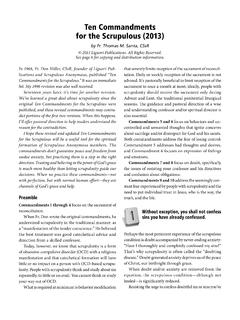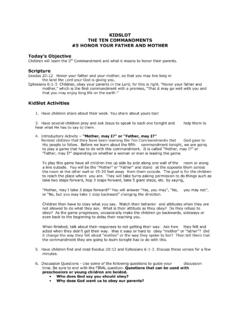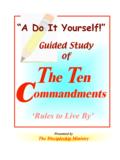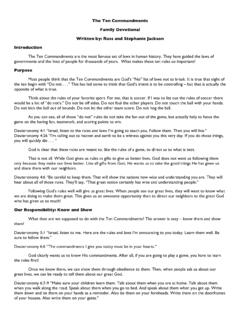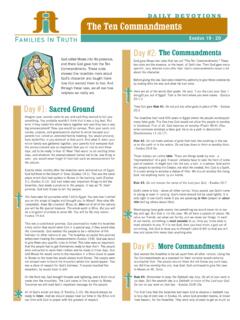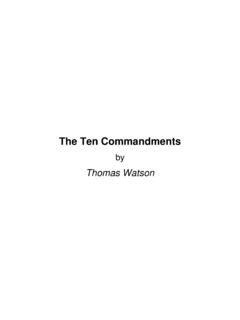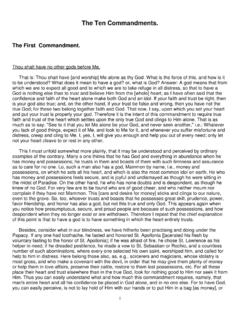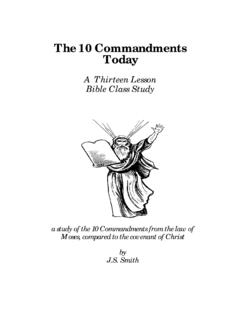Transcription of Ten Commandments for the Scrupulous (2013)
1 In 1968, Fr. Don Miller, CSsR, founder of Liguori Pub-lications and Scrupulous Anonymous, published Ten Commandments for the Scrupulous . It was an immediate hit. My 1996 revision was also well received. Seventeen years later, it s time for another revision. We ve learned a great deal about scrupulosity since the original Ten Commandments for the Scrupulous were published, and these revised Commandments may contra-dict portions of the fi rst two versions. When this happens, I ll off er pastoral direction to help readers understand the reason for the contradiction. I hope these revised and updated Ten Commandments for the Scrupulous will be a useful tool for the spiritual formation of Scrupulous Anonymous members.
2 The Commandments don t guarantee peace and freedom from undue anxiety, but practicing them is a step in the right direction. Trusting and believing in the power of God s grace is much more healthy than letting scrupulosity guide our decisions. When we practice these Commandments not with perfection, but with normal human eff ort they are channels of God s grace and 1 through 4 focus on the sacrament of reconciliation. When Fr. Don wrote the original Commandments , he understood scrupulosity in the traditional manner: as a ma nifestation of t he tender conscience. He believed the best treatment was good catechetical advice and direction from a skilled confessor. Today, however, we know that scrupulosity is a form of obsessive-compulsive disorder (OCD) with a religious manifestation and that catechetical formation will have little or no impact on a person with OCD-based scrupu-losity.
3 People with scrupulosity think and study about sin repeatedly, to little or no avail. You cannot think or study your way out of OCD. What is required at minimum is behavior modifi cation that severely limits reception of the sacrament of reconcil-iation. Daily or weekly reception of the sacrament is not advised. It s pastorally benefi cial to limit reception of the sacrament to once a month at most; ideally, people with scrupulosity should receive the sacrament only during Advent and Lent, the traditional penitential liturgical seasons. Th e guidance and pastoral direction of a wise and understanding confessor and/or spiritual director is also essential. Commandments 5 and 6 focus on behaviors and un-controlled and unwanted thoughts that ignite concerns about sacrilege and/or disrespect for God and his saints.
4 Both Commandments address the fear of losing control: Commandment 5 addresses bad thoughts and desires, and Commandment 6 focuses on expression of feelings and emotions. Commandments 7 and 8 focus on doubt, specifi cally the issues of resisting your confessor and his directives and confusion about obligations. Commandments 9 and 10 address the seemingly con-stant fear experienced by people with scrupulosity and the need to put individual trust in Jesus, who is the way, the truth, and the exception, you shall not confess sins you have already the most persistent experience of the Scrupulous condition is doubt accompanied by never-ending anxiety: Have I thoroughly and completely confessed my sins? That s why scrupulosity is often called the doubting disease.
5 Doubt-generated anxiety deprives us of the peace of Christ, our birthright through grace. When doubt and/or anxiety are removed from the equation, the Scrupulous condition although not healed is signifi cantly reduced. Resisting the urge to confess doubtful sin or sins you ve Ten Commandments for the Scrupulous ( 2013 )by Fr. Thomas M. Santa, CSsR 2013 Liguori Publications. All Rights Reserved. See page 6 for copying and distribution confessed is a pastoral remedy that will bring peace. When you refuse to engage the feeling of doubt and thereby resist the urge to animate and energize your scrupulosity, the wave of anxiety passes over you and you can enjoy the peace that inevitably occurs.
6 Yes, it is diffi cult. Yes, it is fearsome. Yes, it takes practice. But it can be achieved, and the result is shall confess only sins that are clear and certain. Th is commandment gets to the heart of the scrupulosity struggle by directing the Scrupulous conscience to accept that doubtful sins don t count. You needn t confess some-thing that does not clearly and certainly exist. In fact, it s harmful to confess that which is doubtful. Such a practice is not at all helpful and must be can almost hear some of you saying, I m not sure whether I doubt that I sinned or that I m trying to fool myself into believing that I m doubting I sinned. Simply having that thought demonstrates your doubt.
7 That s where this commandment comes into play: You shall confess only sins that are clear and people with scrupulosity think that people who don t have scrupulosity are somehow completely free of doubt . But it s a myth that a healthy state of mind exists in which everything is clear, black and white, and know-able without any sense of struggle. Some people do live in such a state, but they have a condition that s just as problematic as OCD. Doubt is natural and normal. It s not an indication of sinfulness it s an indication of is second commandment also encourages clear and certain confession. Th e penitent states his or her sinful-ness clearly and without hesitation, excuse, or innumer-able details.
8 If the confessor is unsure of what you re clearly con-fessing, it s his responsibility to ask for clarifi cation. If he doesn t ask for clarifi cation, have every confi dence that you have been clearly and certainly shall not repeat your penance or any of the words of your penance after confession for any reason. Fr. Don Miller, who fi rst published a version of this com-mandment in 1968, often saw people with scrupulosity doubting the effi cacy of their confession unless they d prayed or fulfi lled their penance perfectly. Fr. Miller tried to reas-sure his readers that perfection was not required that their eff ort, complete or incomplete, was all that was required. By stating clearly for any reason, I ve strengthened the original commandment by eliminating the excuses people might use to repeat penance(s).
9 Th e Catechism of the Catholic Church clearly teaches that Absolution takes away sin (1459). Within the sac-rament of reconciliation, it s the confession of sins and the absolution of the priest not the perfect or imperfect act of the person who confesses that take away the sin. Penance is an act performed by the penitent in order to repair t he harm caused by sin a nd to re-establish habits befi tting a disciple of Christ (1494). It is distinct from the absolution of sin and the reception of the sacrament of reconciliation. Absolution is not dependent on the completion of penance, whether performed deliberately or accidentally, perfectly or imperfectly. Let there be no confusion in this matter.
10 Th e Church teaches that the only perfect remedy for sin the only perfect satisfaction for sin is found in Jesus Christ, who alone expiated our sins once and for all (1460). According to the Council of Trent (1551), as quoted in the Catechism, The satisfaction that we make for our sins, however, is not so much ours as though it were not done through Jesus Christ. We who can do nothing ourselves, as if just by ourselves, can do all things with the cooperation of him who strengthens us (DS 1691, Philippians 4:13).Even the most perfect act of penance performed with due diligence, without distraction, and with no stumbling upon words or concepts, would be imperfect. Only Jesus Christ, through his passion, death, and resurrection, is capable of the perfect act of satisfaction.
